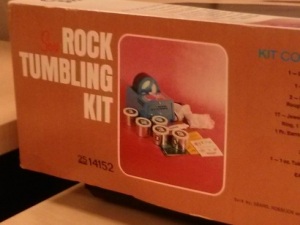Take a moment to Google “Steve Jobs rock tumbler” and one of the first results returned will be a YouTube clip from “The Lost Interview” of Steve Jobs by Robert Cringely.
That’s always been in my mind my metaphor for a team working really hard on something they’re passionate about. It’s that through the team, through that group of incredibly talented people bumping up against each other, having arguments, having fights sometimes, making some noise, and working together they polish each other and they polish the ideas, and what comes out are these really beautiful stones. –Steve Jobs
Having watched this interview in its entirety some time ago, it was this particular metaphor that really resonated and stayed with me.
When I think about this metaphor, I think about feedback being the grit that polishes the stones. We incorporate many types of feedback into our process in an effort to produce a polished product. We run test automation daily, sometimes hourly, to provide feedback on the quality of our software. There are iteration and release retrospectives, where the team gathers feedback on the outcome of the sprint or release. We created a tester retrospective, to focus the feedback on our particular discipline and help polish our efforts and gather new ideas. At the end of every sprint we have a demo, to gather feedback on the new features. We regularly review the stories on our backlog as a team, to obtain crucial feedback on the clarity and quality of our requirements. Even our co-located work environment was envisioned as the ultimate breeding ground for collaboration and feedback.
It is possible that you have numerous feedback mechanisms in place and yet still are not achieving the desired amount of polish. In that case, I would recommend turning your attention to the stones themselves. First of all, great feedback is not always positive feedback. The team dynamic needs to be one that encourages people to share both the positive and the negative. Also, as Steve Jobs alluded to, the best quality feedback is often provided by people who are passionate about the topic or project. Great ideas rarely come from just going through the motions. Additionally, breaking down the silos and building a cross-functional team enriches the feedback. The shared understanding increases the opportunities for unique perspectives.
So if you are starting with a rough idea, dealing with a struggling project, or faced with an incohesive team, I think you should try adding more grit. There will likely be an increase in friction, but the friction is what smoothes the rough edges. I now embrace the friction, as evidenced by the rock tumbler sitting on my desk. This toy now serves as a reminder of the metaphor for high performing, passionate teams.


